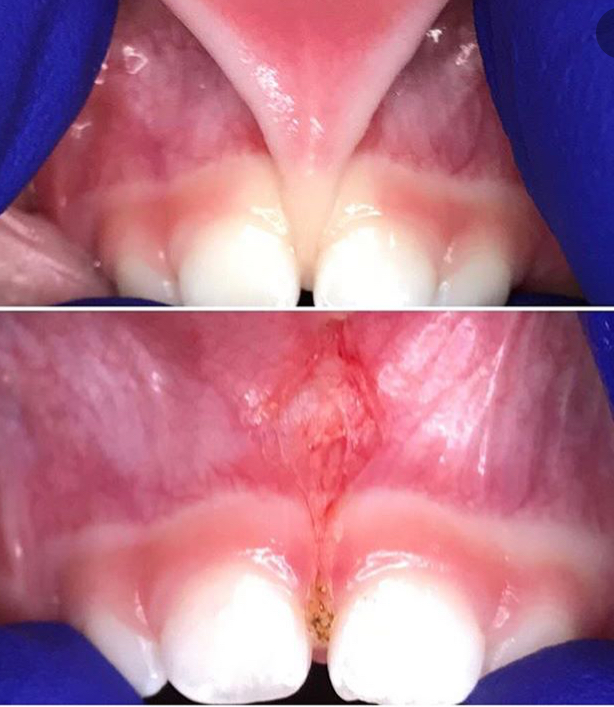An overview and first-hand account on Tongue and Lip Tie
- Do you struggle with breastfeeding? (Fussy during or after feeding, difficulty securing and maintaining a latch during feeding, cracked or blistered nipples, painful nursing?)
- Does your baby refuse a bottle?
- Do you have a picky eater? Does your child only want certain textures or soft foods like puffs, crackers, or peanut butter?
- Does your child store food in their cheeks?
- Does your child have trouble chewing and swallowing solid food or drinking water?
- Does your child have a lisp or speech problems?
- Does your child snore, mouth breathe or struggle to breathe?
- Does your child have significant dental decay or malalignment?

These issues can all be signs of a potential tongue or lip tie. Tongue and/or lip tie is a congenital condition present at birth where the tissue connecting tissues are too short causing restriction of the tongue and lip’s range of motion. Roughly 4% of infants are found to have a tongue or lip tie, and they are most often found when the child has a shallow latch when nursing.
Often, if tongue or lip ties or missed, we see failure to thrive or early discontinuation of breastfeeding. Many children adapt, eat normally, and can go symptom-free. Sometimes we don’t see effects until late childhood or adulthood. I often see parents with tongue and lip ties that have gone uncorrected. These folks may have pain or clicking in their jaw, difficulties with speech, chronic migraines, dental issues, or sleep apnea.
Tongue and lip ties are genetic and boys are more susceptible as it is a semi-dominant x-linked inheritable trait. It is likely associated with the MTHFR gene, which is responsible for methylation, a biochemical process that impacts nearly every function in your body including stress, energy, detoxification, immune response and inflammation, etc. Remember, though, that genetics are not fully responsible for how we present. Epigenetics, however, is the result of environmental factors on genetics. Genes are more likely to go haywire when we disrupt them with negative environmental factors, like smoking. You can improve epigenetics by eating clean, antioxidant-rich food, staying hydrated, avoiding toxic behaviors, managing stress, and taking basic supplements like methylated B vitamins, fish oil, probiotics and vitamin D for example.
Do you suspect that you or your child has tongue-tie? Consult with a trained physician (not all doctors are aware, most do not screen). Dentists are a great resource, but often, children do not see their dentist until after their first birthday. The sooner the tongue or lip tie is found and corrected, the better, but it is never too late.
Trained dentists can use a simple laser frenectomy (laser) or frenotomy (scissors) to release the tight band of tissue so the tongue or lip is free to move normally. A frenectomy is ideal and usually performed with a CO2 laser to completely eliminate the tissue rather than simply snipping it. Some dentists choose to use general anesthesia for this brief procedure, which comes with its own set of concerning risk factors. A gentle well-trained dentist can employ conscious sedation by administering a medication that allows for brief intervention and is less risky to the child. Access varies depending on location and finances (many specialists do not bill insurance).
I have become the expert in screening and supporting children with tongue and lip tie after discovering that my 16mo had a severe presentation. He was a great nurser- too great- because he always had aversions to eating solids and only wanted to breastfeed. After seeing dental decay on his tiny teeth, I suspected tongue and lip tie, and his dentist confirmed that it needed correcting, but she wanted to do general anesthesia and crown all of his (8) teeth at the time. I chose to go with a gentle specialist in Seattle who does frenectomies with CO2 laser and conscious sedation. This was the beginning of our journey. I then worked with an occupational therapist to troubleshoot ways of enhancing oral motor skills, but really, my child had no interest in food. Creativity, novelty, and patience were key to food acceptance. Now, at 2.5yo, my kid eats pretty well. We still have some picky tendencies, but we are resilient and continue to offer healthy foods at every meal and snack. I feel that if I hadn’t stuck to my guns on finding the cause of my child’s picky eating, he would be the kid that only eats puff snacks and cheese (he still eats these, too, along with broccoli).
As a naturopathic doctor, I am blessed to have nutrition and developmental training for food introductions. Now, I can attest that even when you know a lot, there’s always more you can learn about your unique individual of a child. To all you parents of picky eaters, I see you and feel you. There is hope for a broccoli-eater yet!


